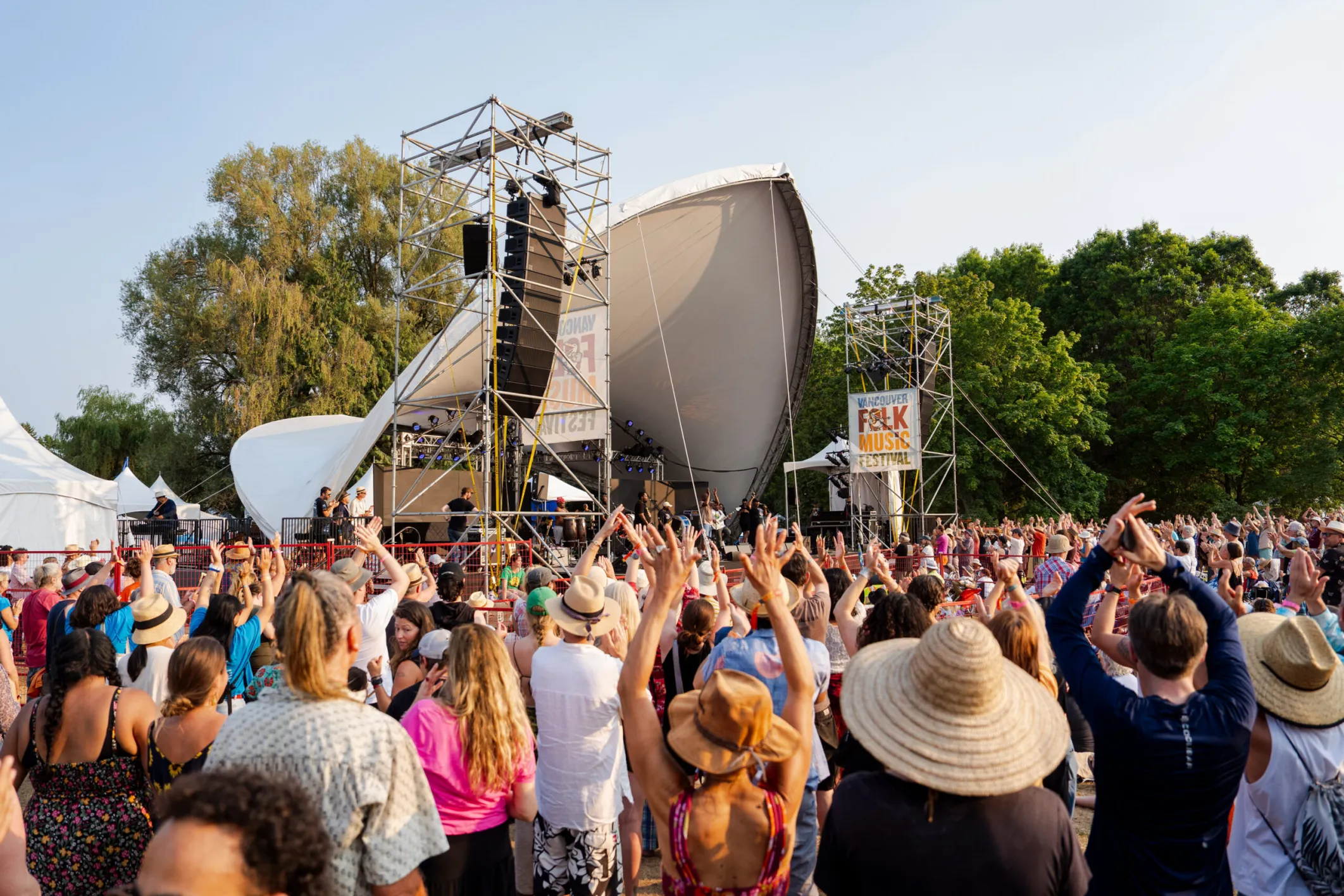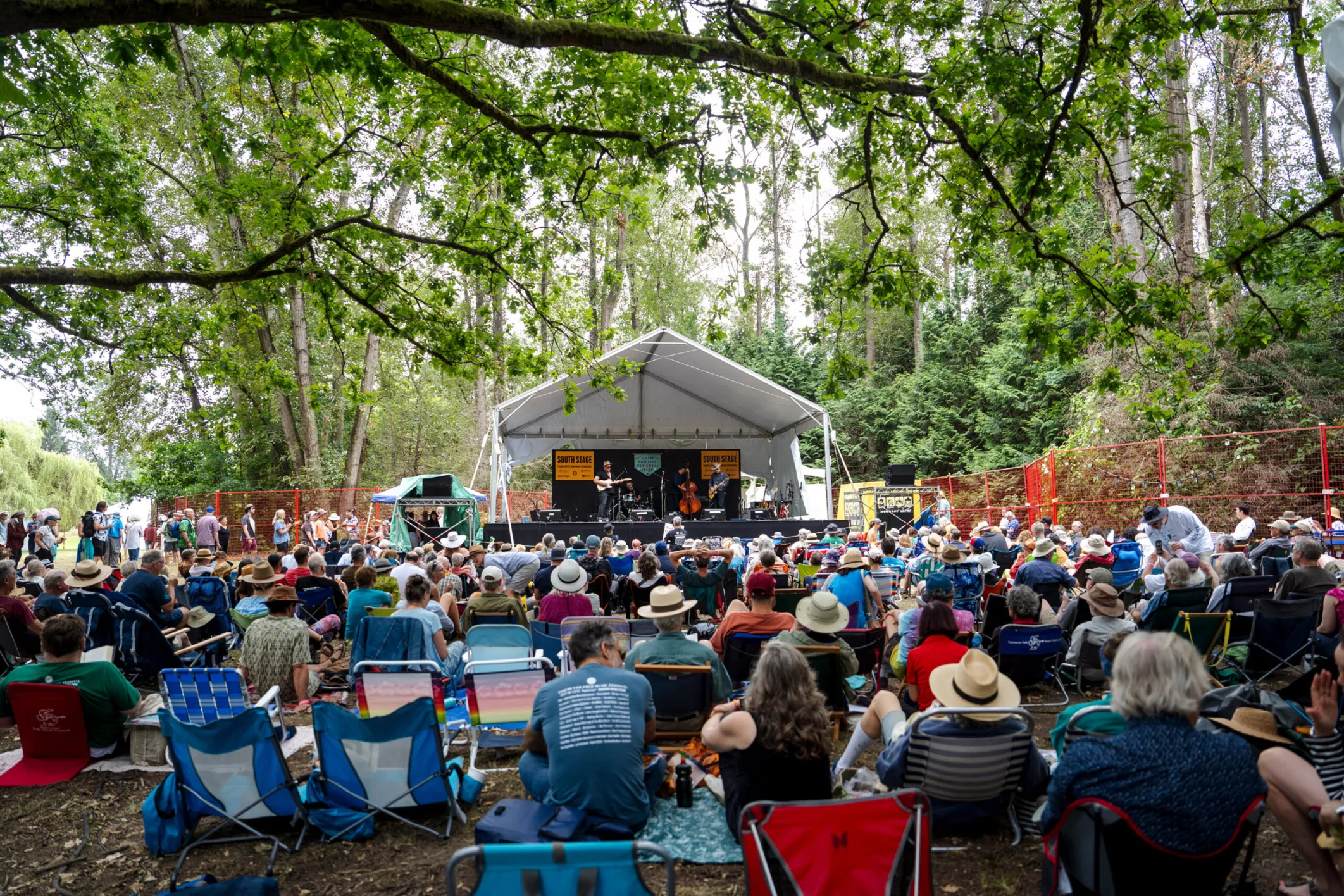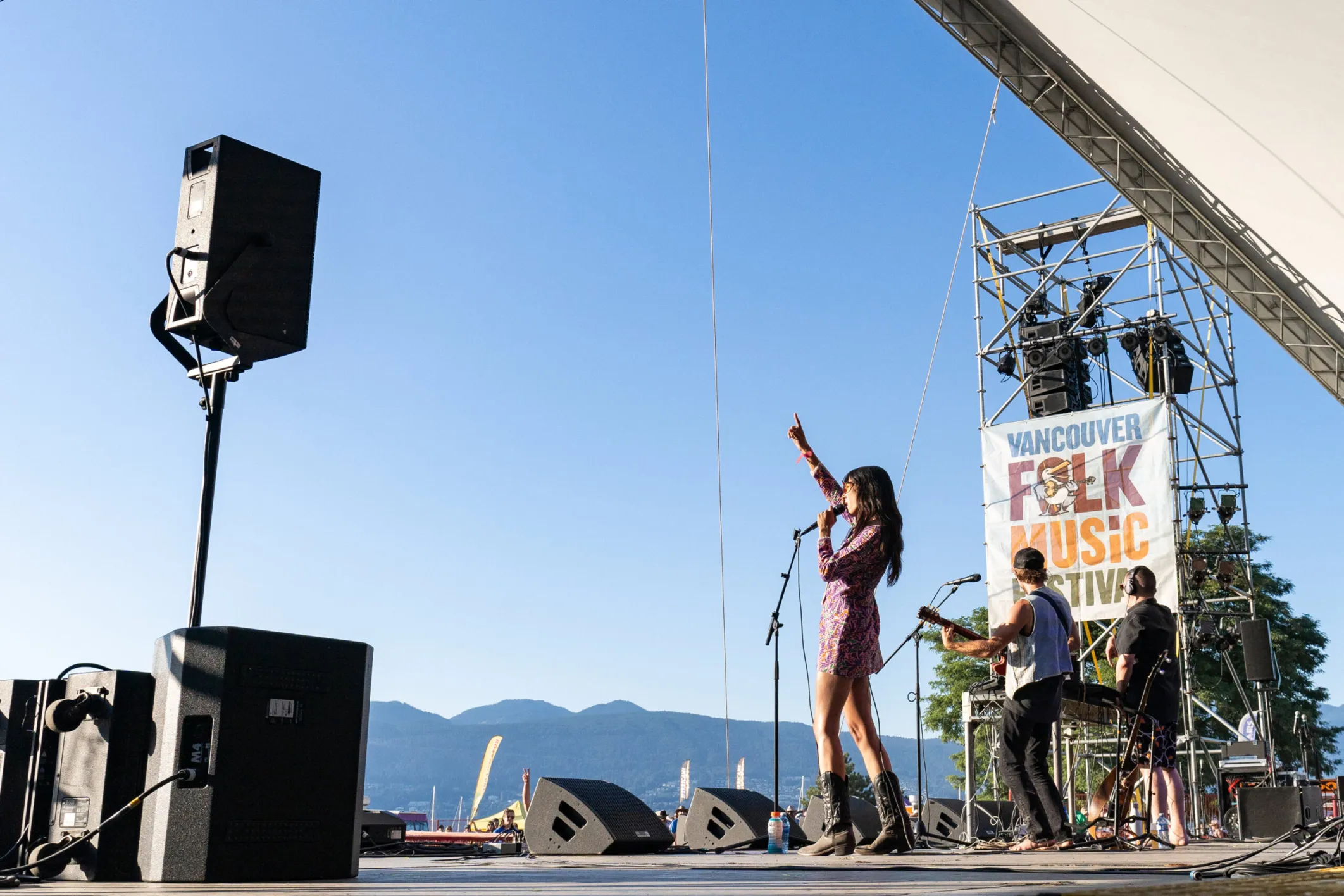There is a striking statement in the 2025 President’s Report for the Vancouver Folk Music Festival, when Erin Mullan tells members, “I changed my will to include the folk music festival in it and I encourage you to do the same.”
Fiona Black, the artistic director of the festival, chuckles when I confess to being startled by the ask, and she explains, “There’s definitely a segment of professional fundraisers that reach out and encourage supporters to bequeath a portion of their will, if not their full will.”
Black (who is close to marking 30 years as director of programming at Capilano University’s performing arts centre) knows first-hand how that sort of generosity can benefit the arts: “I work a little with the West Vancouver Memorial Library, and Robert Leslie Welsh, who was a big supporter, left a huge part of his will to the library.” Welsh, who died in 2000, stipulated that the $2.5 million bequest go to music-related matters, so the library opened a recording studio and started a free concert series, among other things. His donation is still funding events. “I do a North Shore Jazz festival show there every year, and it’s wonderful,” Black says. “We know we have a lot of older attendees, and maybe they haven’t thought of that,” she adds. “Maybe bequeathing a small portion of their will would be a comfort to them, that they’re helping the survival of our festival.”
The folk fest is two years shy of its 50th anniversary and will probably make it at least that far, but still, the request speaks to the challenging circumstances facing music and the arts across Canada. In B.C., the Vancouver Art Gallery has announced massive cuts, Mural Festival 2025 is cancelled, Kispiox Valley Music Festival in Terrace is taking a year off, and Ambleside Music Festival is entering its second year of hiatus.
The much-loved Vancouver Island Music Festival has also been cancelled for 2025, with artistic director Doug Cox, who had been with it for 28 years, leaving under protest that he didn’t want to “water down” his vision by adding commercial country and “retro-rock” acts to keep his job.
Related stories
- The Uncertain Future of Vancouver’s Music Festivals
- Where Have All Vancouver’s Arts Leaders Gone?
- Vancouver Musician bbno$ Is Full of Gratitude and Excitement as His Star Rises
“I really respect what Doug built,” Black notes. “They had a 30-year great run.”
She has been programming the Vancouver Folk Festival since 2023—the year that nearly wasn’t. That began as a voluntary position, when she was one of six new board members who signed on, deciding that “we shouldn’t take a year off. It would be really difficult to bring the festival back after cancelling.”
Black had the most experience with programming, “so I was the one who put up my hand to say, ‘I can take the lead this year.’ I’d never programmed a three-day festival before. I’d been a concert series programmer, with a concert once a week or every two weeks.”

Photo by Clayton Wong, courtesy of the Vancouver Folk Music Festival.
It was hard work, not sustainable as a volunteer. Afterward, she stepped down and was contracted to take on the paid position of artistic director. “We’re still building back, but hopefully the continuity, with me being in this role, is helping with that.”
The 2023 festival turned a modest surplus of over $250,000. It had a warm, appreciative community vibe, with attendees and performers all very aware of what had nearly been lost. By contrast, 2024 ran a deficit, according to the treasurer’s report, of over $200,000 against an operating budget of $2,300,000.
Black takes this in stride: “A small deficit, we can carry. And we shrink down to a very small team in the fall. All of our expenses are now, during the festival.” She says they hope to “squeak through with a balanced budget” for 2025. Ticket sales account for about half the budget, but grants are crucial, too. The B.C. Fairs, Festivals and Events fund—a COVID-recovery measure—was “a huge part of our surviving 2023,” Black explains, and made a welcome, surprise return in 2024, despite having been initially described as one time only.
With the BCFFE now gone, some of the gap is being filled by the Destination Events Program—a “smaller pot” focused on “major-destination festivals that support tourism.” The festival had to demonstrate “that we are bringing people to Vancouver for the festival.”
The program is providing a meaningful chunk of change, though Black notes that grants haven’t kept up with inflation or rising costs. Plus, the B.C. government has never been generous with grant money. “That’s true of all not-for-profit arts organizations, whether they’re running venues or festivals or societies,” she says. “I have seen the figure that B.C. per capita is the worst for arts funding in the country. I’ve talked to other provinces, and I get really jealous of how much they’re getting, provincially, municipally, compared to us.”
And again, the Destination Event Program grant was “billed as a one-time-only measure.” Black interprets this as a hint to “stand on your own feet,” an exhortation that we’ll help you this time. “But with the way the economy is growing, with expenses, tariffs… there are so many threats. We do need government support, I’m sorry. From all levels.”
Looking further afield can also help: many European countries help finance their artists to tour—which is how the late Ken Pickering managed to bring so many top-name artists over for the jazz festival year after year. The Canada Council has a Foreign Artist Tours grant, which supports bringing in artists from overseas, though it’s best if more than one festival is involved. “The more you get on board, the more chances you’ll get funding,” Black explains.

Photo by Clayton Wong, courtesy of the Vancouver Folk Music Festival.
Les Mamans du Congo will play VFMF this year as recipients of that money, from a proposal put together by the Calgary Folk Music Festival. “We’re really happy it’s an all-Canadian tour,” Black says, “because the Democratic Republic of the Congo is one of the banned countries right now in the U.S.”
Just under 10 per cent of the festival’s funding comes from Heritage Canada, which includes strict mandates around diversity and inclusion that Black says align well with the festival’s own values. “We’ve always been a festival that champions the marginalized, the underdog, the people who don’t have voices. And we always will.”
Then there’s the historically tricky issue of private sector investment. In 2024, the festival hired a sponsorship manager for the first time—a move Black sees as necessary. “But we definitely want the sponsors to align with our values. I don’t think we would go to Shell Oil.”
Currently, corporate sponsorship—either as cash or in-kind service provision—is small, running around 5 per cent, but that is expected to increase.
The need to get 20-40-year-olds out has seen the festival create ticket options for those who only want to attend for the evening headliners, with programming bringing high-energy dance acts on Friday and Saturday night. “By the last slot, we’re starting to lose people,” Black notes. “It’s a long day, but I know the younger folks will stay. They want to dance. They want to let loose.”
Last year, that was facilitated by the Saharan band Etran de L’Aïr. “I loved it,” she says, “because everybody was up dancing. The seated area just kind of devolved, and people moved over and let the dancers take over.” This year she hopes a similar energy will be offered by the Moroccan French duo Bab L’ Bluz and the Zawose Queens from Tanzania.
But interestingly, one of the most adventurous choices Black has made this year is local. “I’m very proud that Haram is performing on the main stage this year. If you know Haram, you know that this 10-piece Vancouver band is so unique. They mix Arabic music with free jazz and rock. They’re avant-garde but accessible at the same time. They’re starting the festival for me, and that’s an intentional choice. You don’t see our local bands getting the evening slots—they tend to go to the visiting artists and the bigger-name artists.
“I’m really proud to do that.”
Read more music stories.









